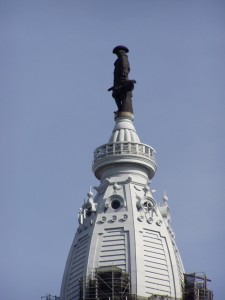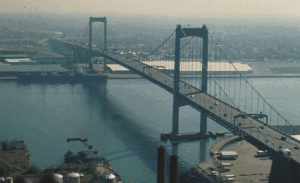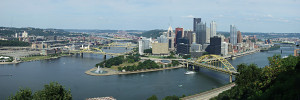JANUARY 30 – Philadelphia, PA
I wake up this morning to the sound of a car horn 19 floors below me. Even up here the sound is clear and loud as if it is right outside. I sit in a corner window and look out on Market street, normally bustling, but now relatively quiet, even abandoned for some seconds at a time.
It’s a Sunday morning in January and light snow is falling. In fact, it is not exactly falling since each flake is wafted upward near the buildings. Sometimes I can watch the same snowflake levitate before my window for as much as 5 seconds before it is lost from view among the millions of its fellows. The office building across from me is exactly aligned with my hotel room but is set back from Market street by three or four feet more than my window and so affords me a view down the street to City Hall. On top I can see the austere statue of William Penn, his back turned from me, his shoulders covered with snow.
I am looking straight across now into the window of an office. All the offices are dark, but all the curtains, if they have them, are open so that I can look into each one. This one is a large corner office and I wonder, immediately, what kind of person works there. The desk is clean; unobstructed by clutter of any kind. The office is rather spartan, in fact, except that it contains, in addition to the desk, a round table with two chairs. Also, around the perimeter of the window shelf are a number of pictures in frames and a vase with no flowers in it. I can’t see the pictures since they face into the room, away from me, but I fancy they contain the smiling visages of some handsome children, now in their late teens or early twenties.
Maybe someone who keeps his office so neat can also keep his life in order and I like to think this guy also has a picture of he and his wife of twenty-some years on a beach in the Bahamas. No, make that Fiji. Yeah, the guy with the corner office is going to be able to afford it. As I examine the office more closely from my vantage point a mere thirty or so feet away I realize that the term spartan was overstatement. There are, in fact, a number of objects present which lend some definition to this office’s owner.
A second glance reveals a large globe in the corner of the room sitting on a stand about waist high. Does this say something about the occupant’s business, requiring geographical reference, or his own personal love of travel? Surely the latter, I think, for a globe is not as precise as an atlas for such reference. Yet, the thing might be some sort of status symbol, or backdrop for clients, suggesting that the man possesses a long view or a worldly approach. I secretly hope that he is, like myself, simply someone who likes maps.
In another corner I note a couple of personal items that I am surprised at myself for overlooking at first. There are two white binders, a small brass replica of the Liberty Bell, and a white, limestone looking rock of unknown provenance. The binders are not out of place in an office, of course. They look like computer manuals, to me, and indeed there is a computer monitor on the desk. What is odd, though, is that there are no other books or publications visible anywhere in the office. I carry more reading material in my flight case than this guy has in his entire office. The rock is curious, I think, because of its plainness. If it were a geode or the fossilized Trilobite it might betray some interest, by the owner, in geology. In the case of a polished geode it might even be just a conversation piece or decoration. But it is as pale white and nondescript as a piece of gravel. What is it, then? Perhaps it is a souvenir; a piece of coral from the beach in Fiji. But it is ridiculously large to be a memento from a vacation. It probably weighs five pounds.
My little boy and I, when we are in the city, play a game with each other called “what is his story.” We watch people passing on the street and take turns describing their lives and what they are doing. I will say “that lady walking fast with her coat pulled tight around her just won $10,000 on an instant lottery ticket and is hurrying home to tell her husband.” He will say “that man carrying the umbrella is really an FBI agent. He is undercover trying to bust a drug cartel. His umbrella is really an weapon.” And so on. So when I look into this corner office I try to make a life for this, not fictional but still unknown, character.
My creative guess is as follows: This guy likes the perks and prestige of his job; Vice-President of marketing, I think. But he finds the work unfulfilling and hollow. He works in the city because he has to, but he pines for the countryside. His nice home in a close-in suburb is also too constraining for him, like a necktie pulled a little too tight. So, he has saved his money and bought himself a small farm, out near Lancaster, I think, or perhaps in the pine barrens in New Jersey. On this farm is a ramshackle farmhouse where he spends his weekends, maybe even today, fixing it up. After spending the week firing electrons back and forth from his computer to another, he likes the feel of a hammer in his hand; something solid and tangible. He likes to sit and look at the drywall he put up in the kitchen of his farmhouse. Sure, there is a blemish here and there where the joint compound is not perfectly smooth, but its not bad at all for a guy with smooth hands. Behind the house is a collapsing old hulk of a dairy barn which he sees in his mind’s eye as a guest house; somewhere he could bring select friends from the city to admire his country life. Behind the barn is a little bluff with an outcropping of white limestone. One day he took his hammer and knocked off a protruding piece. He put it in the trunk of his BMW and carried it up to his office when no one else was around. He doesn’t like to show off. I have decided that he is a geography buff and keeps the globe because he likes it. He keeps the rock, also, not to show off, but to keep a little piece of his dream next to him in the soul-sucking city. The rock is in a corner of the window shelf, after all, not in the middle of his desk. It is there for him, and sometimes he runs his hand across it to calm himself after a frustrating meeting or teleconference gone bad.
The little Liberty Bell is more puzzling to me. It could be an award, maybe something his company gave him in honor of an anniversary or the landing of a big contract. If it is, he doesn’t value it, for it is tucked far back in the corner behind the rock. Maybe it’s a souvenir, also, although a Liberty Bell is a curious souvenir for someone who lives in Philadelphia.
I have fleshed out enough of this man in my mind. I like him. He is solid and hard working, but he yearns for something more meaningful out of life than making sales. He loves his family, is proud of his kids (they go to Princeton and Penn. State respectively), and has a country soul. His coworkers think he is a little strange (the rock) and his country neighbors look down their noses at his amateur carpentry. To them he is a city slicker. To the city folks he is a mystery. He is out of place in both the worlds he inhabits and that somehow endears him to me even more.
__________________________________________________________________
In the evening I go downstairs to the hotel restaurant, a place called the “Elephant and Castle or Castle and Elephant,” a reference to an intersection in London, I believe. The restaurant specializes in British food, as if that was a selling point. I am seated by a waiter who seems irritated by my very existence. Consequently I make him refill my iced tea about seven times during the meal. The menu contains such tasty offerings as bangers and mash, shepherd’s pie, and Yorkshire pudding. Haggis and tripe are nowhere to be found, so I settle on the shepherd’s pie and begin to dig in. Dig is the appropriate word since this shepherd’s pie is literally a pile of hamburger, peas and carrots in the bottom of a dish completely covered by mashed potatoes. It isn’t too bad.
As I eat and torment the waiter I happen to notice that I am sitting in a small enclosed sunroom which sticks out onto the sidewalk about six feet. In daytime one would be able to look up through the glass ceiling to see the tall buildings all around the hotel. Being dark outside it seems rather like eating your meal in an aquarium with passers-by gawking at your table manners.
About halfway through the meal I notice that a lump on the sidewalk outside that I had taken to be a pile of rubbish has rolled over and revealed itself to be a homeless man. He has been lying flat out on the sidewalk and when he sits up he is staring straight at me with a baleful expression. I halt, a spoonful of mashed potato halfway to my mouth, and stare back transfixed. He is a small black man with grizzled hair and he is wearing several ragged coats. All around him are discarded newspapers, which had served as his blankets. His eyes are unfocused as if he has just crawled out of bed which, in a way, I guess he has.
Being my mother’s son I am kind of a sucker for guilt, anyway, but I find it hard to even take another bite of my meal. Here am I, a not at all undernourished “young” man eating what turns out to be a nineteen dollar meal, after tip, while one of my elders sits on the sidewalk on a freezing cold January day with no home, no one to care about him, and no prospect of a meal like mine in the foreseeable future.
To my discredit I go upstairs quickly after paying the bill, but the old man stays with me. I reflect that a really good person would take part of his meal in a box over to the man or give him some money. But I don’t do that. And I’m not sure why. I tell myself that it is because I am afraid of being accosted by him, or by an unsavory looking character waiting at a stoplight nearby. But, of course, the old man would be no match for me, unless he has some kind of weapon. And why would he? And it is a busy street, with many pedestrians stepping over and around the old man. And, and, and… Probably I am afraid of what those pedestrians or my fellow diners will think. What a revolting excuse.
It is easy to rationalize the plight of a man like that by saying that his own choices have led him here. Even so, it breaks your heart to think that he has been, in the dim past, somebody’s baby boy, cheerful and full of promise, just like my little boy. If that’s not worth the benefit of the doubt I don’t know what is.
As I had done with the man in the corner office my mind plays a game of “what is his story” with the old man without the moderating influence of my cheerful little boy. I go to bed feeling lousy, indeed guilty and lousy.
But I wake up early in the morning and I fly to Jacksonville, Florida where it is warm and sunny. It’s funny how a change of scenery can improve your temperament. I leave winter and the old man behind me in Philly and I go on about my life, as we all must do. But every game of “what is his story” is not fiction. Behind each person we pass on the street there is a real story; happy, sad, or, like most of us, happy and sad. And I think it behooves us, when we are playing “what is his story,” like we all do, to remember that fact. And perhaps sometimes we need to take some shepherds pie out to the man lying on the street and maybe ask how the game is going for him.


